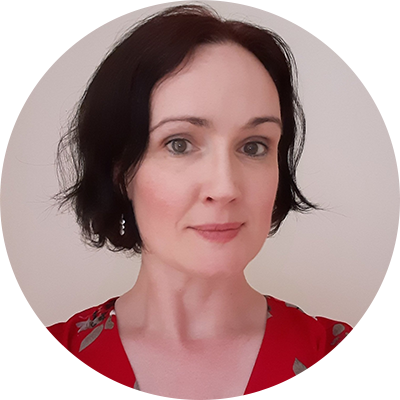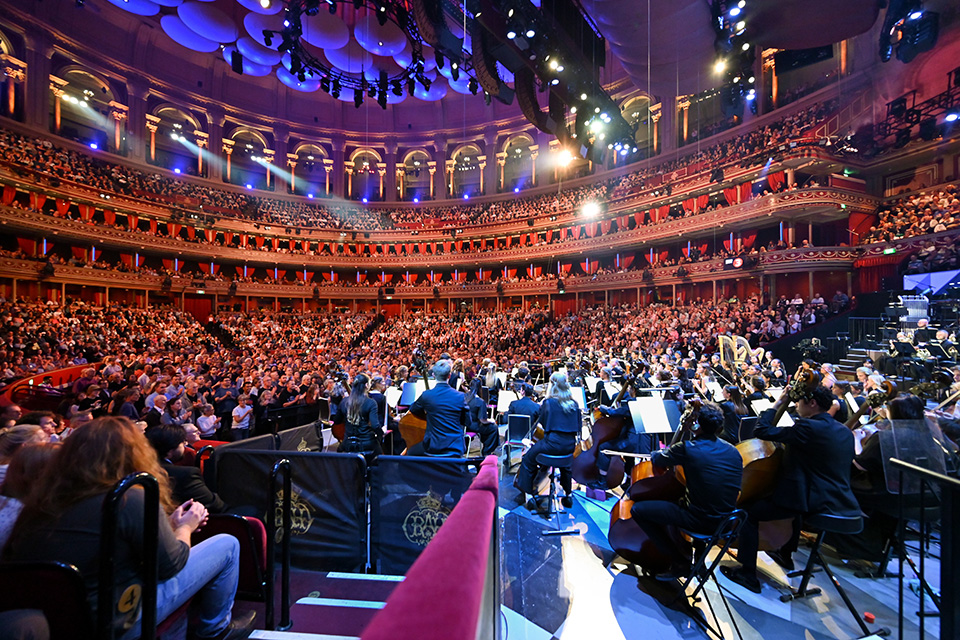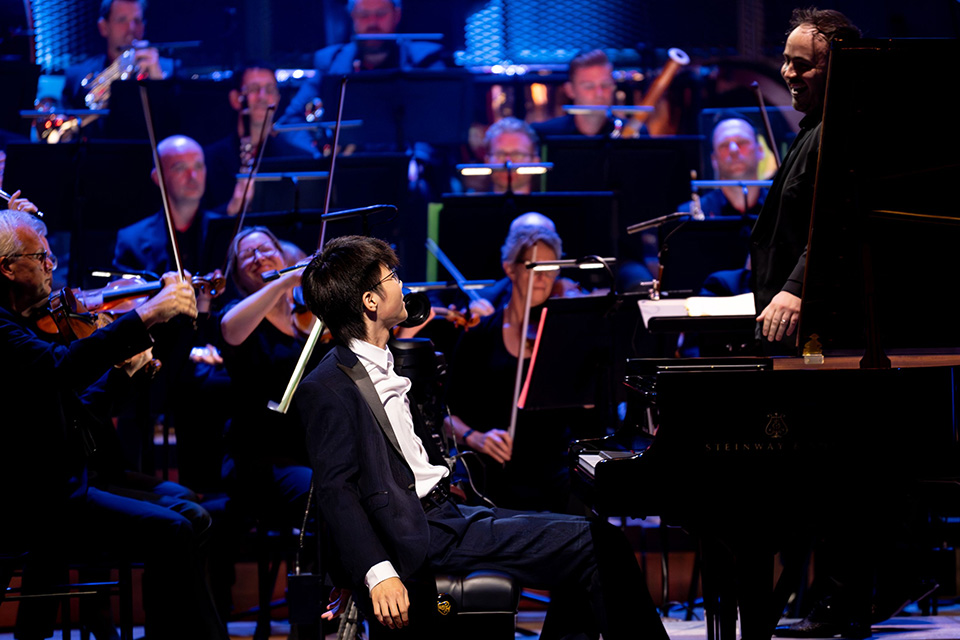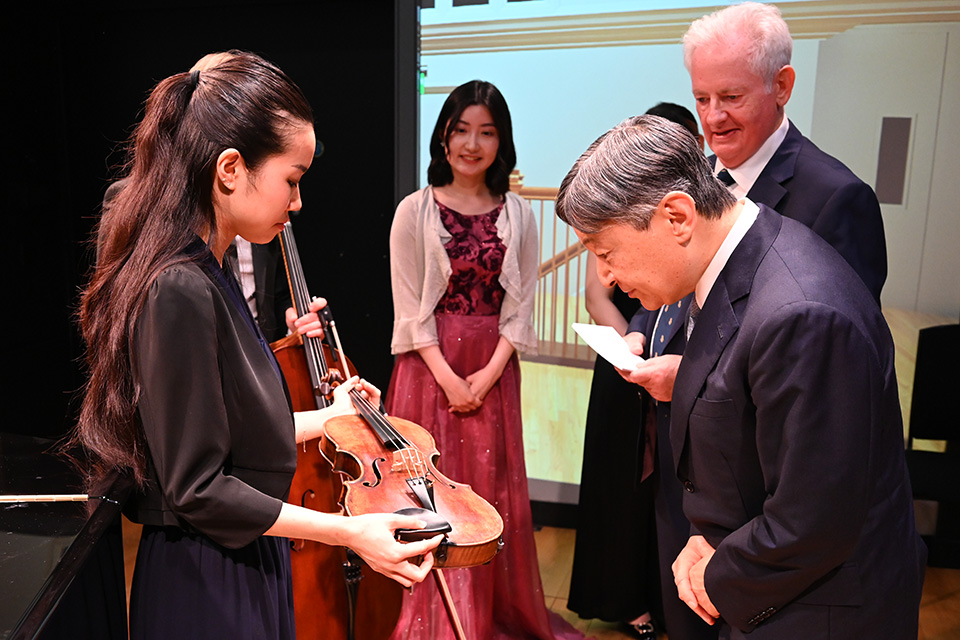Happy Birthday, Holst!
Share #UpbeatOnline
In Holst’s 150th anniversary year, Upbeat discovers the man behind the music, focusing on his time at the Royal College of Music and his friendship with fellow alumnus, Ralph Vaughan Williams.
[video1]
There’s an apocryphal story that someone went to see a Shakespeare play, and commented afterwards that it was ‘full of clichés’; they had heard Shakespeare quoted and copied so often that the original sounded hackneyed. Gustav Holst’s reputation has faced a similar challenge with his suite, The Planets: modern listeners may struggle to filter out the many film scores that emulate the work, and may risk becoming over-familiar with a piece so frequently programmed and broadcast. The Planets almost sounds as though it has always existed – it’s hard to picture the Western musical landscape without it. And yet if we try to imagine the impact of hearing it for the first time, Holst’s startling originality becomes more apparent.
For those Royal College of Music Symphony Orchestra musicians who played The Planets at their sold-out, critically acclaimed BBC Proms debut in August 2024, the intricacies of Holst’s orchestration and deft treatment of themes are even more tangible. As his friend and fellow alumnus-turned-teacher Ralph Vaughan Williams pointed out, Holst made it look easy: ‘the orchestration is masterly; so masterly, indeed, that it is not noticeable.’ As we mark the 150th anniversary of Holst’s birth, then, let’s celebrate him as a true original, whose years at the Royal College of Music would prove pivotal in developing his unique voice.
[video2]
A multicultural background
Holst’s background laid the foundations for his appreciation of a diverse array of cultures. His great-grandfather was of German heritage, born in Rīga in Latvia, and taught at the Imperial Russian court before seeking refuge in England. His son Gustavus Valentine settled in Cheltenham, raising children including Adolph von Holst who went on to marry pianist and singer Clara Lediard. They had two children: Gustav Holst (he dropped the ‘von’ after the First World War) and his brother Emil – who became a famous Hollywood character actor under the stage name Ernest Cossart.
Given this rich heritage, is it any wonder that Holst embraced an eclectic range of influences? He absorbed different inspirations like a sponge: Wagner and Purcell; the idealism of William Morris and Walt Whitman; Hindu literature and philosophy – including lessons in Sanskrit at University College London, after which he made his own translations of Sanskrit texts before composing works such as the Hymns from the Rig Veda.
The Planets was inspired more by astrology than science; Holst was at once down-to-earth in his daily life yet drawn to the occult and the other-worldly. He also adopted the Hindu doctrine of dharma, which he said is ‘one’s path in life’, arguing that one should stick to that path ‘without worrying if it was successful or not’.
[image1]
Pantomimes and politics
Holst’s path towards becoming a professional musician was a rocky one. He suffered with the nerve condition neuritis, preventing him from becoming a concert pianist, and was taught the trombone as a treatment for asthma. He began composing in his teens, and this early promise earned him a place at the Royal College of Music, where he started his studies in 1893. His professors were Frederick Sharpe (piano), William Stephenson Hoyte (organ), George Case (trombone), Georges Jacobi (instrumentation) and, for history, the Director of the College, Hubert Parry. Following lessons with WS Rockstro and Frederick Bridge, Holst was invited into the composition class of Charles Villiers Stanford, with whom he had longed to study.
Holst was not from a wealthy background, surviving on £1 a week from his father – who had to borrow extensively to support him. Holst became both vegetarian and teetotal to save money, although this also reflected an ascetic sense of discipline (he celebrated his 21st birthday by walking from Cheltenham to London). He earned money by playing the trombone at summer seaside resorts and in London theatres. As Vaughan Williams later recalled, Holst ‘rushed into the melée of life armed with his trombone and picking up a living where he could: sometimes in a travelling opera company, sometimes playing in a pantomime or a pier band’.
Vaughan Williams added: ‘The result of this unconventional but practical training was that theory and practice always met in him. Indeed, he never forgot the theory that he had imbibed from Stanford and Rockstro, but he implemented it by the live experience of the band room and the rehearsal pianoforte.’
[quote quote="He rushed into the melée of life armed with his trombone and picking up a living where he could: sometimes in a travelling opera company, sometimes playing in a pantomime or a pier band." author="Vaughan Williams"]
[image3]
A Scholarship awarded by the College in February 1895 allowed Holst free tuition and a maintenance grant of £30 a year. He lived in a bedsit in Hammersmith, later writing Hammersmith (1930) for military band, a work that his daughter, composer-conductor Imogen Holst – who also studied at the College – described as a meditative response to being ‘in the middle of an over-crowded London’. It was in Hammersmith that Holst met Imogen’s mother, soprano Isobel Harrison, while he was conducting the Hammersmith Socialist Choir he helped to form; he was a regular at meetings held by William Morris and once played the harmonium on a cart dragged round Hammersmith by his fellow socialists as they distributed pamphlets.
[image4]
Holst sometimes attached a nib to his finger if his neuritis made writing too challenging, saying that his arm felt like ‘a jelly overcharged with electricity’; playing the piano continued to be difficult, and in College he was likelier to be found in the Library than in a practice room. He could not always manage to copy out his works, imploring one singer: ‘please take care of all these songs and return them as soon as you can. I have no copies, and no time to copy them.’
[quote quote="Gustav Holst was a great composer, a great teacher, and a great friend. These are really different aspects of the same fact. It was his intense human sympathy that fostered his musical invention." author="Vaughan Williams"]
Lifelong friendship
It was at the Royal College of Music that Holst became friends with Vaughan Williams, their friendship lasting until Holst’s death. They met as Vaughan Williams was returning to College having finished studying at Cambridge. Holst could be quirky in his interactions, and on meeting Vaughan Williams immediately quoted a line from Sheridan’s play The Critic – which, thankfully, resonated, and they soon discovered that they had lots in common, including growing up in Gloucestershire.
[image5]
Vaughan Williams started coming along to Holst’s gatherings at Wilkin’s teashop in Kensington, where they discussed, according to Vaughan Williams, ‘every subject under the sun, from the lowest note of the double bassoon to the philosophy of Jude the Obscure’. They embarked on ‘field days’ during which they shared what they were working on, a habit that continued even when both were famous. Stanford had encouraged his students to be self-critical, but this pair found a way of critiquing one another’s work that was perhaps even more enriching. Holst’s objectivity balanced Vaughan Williams’ more unruly temperament, while Vaughan Williams’ experience helped Holst, who had previously struggled with certain compositional fundamentals.
[quote quote="... as soon as he had made his point, he stopped." author="Imogen Holst"]
A great composer, teacher and friend
Although he valued his lessons with Stanford, Holst was rather allergic to theorising about music, once saying that ‘a composer is usually quite unconscious of what is going on’ and even calling himself ‘a fool in music’. His style was instinctive yet skilfully executed, the chromaticism of his early works giving way to music grounded in tonality, but often with rich harmonic effects created through bitonality or polytonality, including interweaving lines in different keys. As Vaughan Williams wrote of his friend: ‘Holst’s watchwords were economy and clarity. One really grows out of the other… though a visionary he was never a mere dreamer. The very clarity of his purpose and the means of his art saved him from this’. Imogen Holst also wrote of the leanness of her father’s approach: ‘as soon as he had made his point, he stopped’.
Holst took these principles into his teaching roles at the Royal College of Music (alongside Vaughan Williams) and at St Paul’s Girls’ School and Morley College. As Imogen Holst wrote: ‘It was 26 years since he had first entered the College, and several of his fellow students were now his fellow professors. He had great hope of the work there, for he knew that in Sir Hugh Allen he would find a Director who agreed that “the moment one ceases to think of human beings and dwells mentally amid schemes and systems one is just damned as a teacher.”’ It is this humanity that was at the heart of Holst’s gifts as a composer, colleague and professor. As Vaughan Williams put it: ‘Gustav Holst was a great composer, a great teacher, and a great friend. These are really different aspects of the same fact. It was his intense human sympathy that fostered his musical invention.’


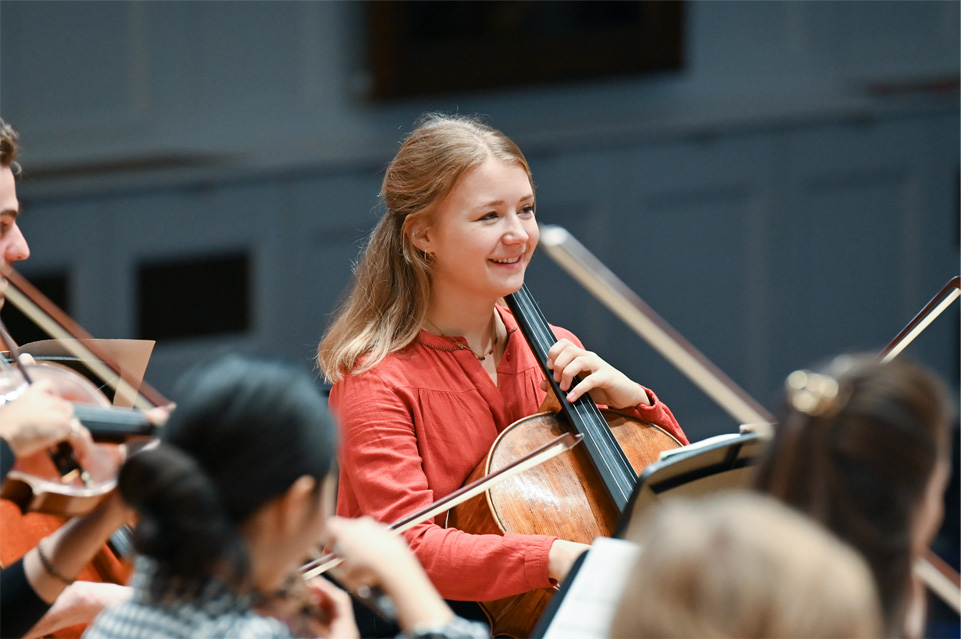
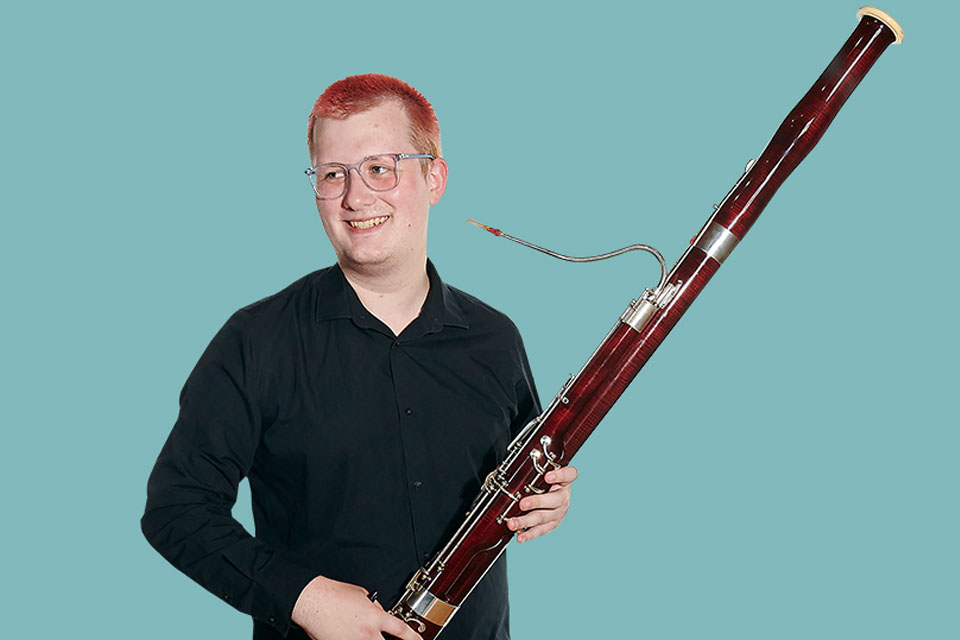
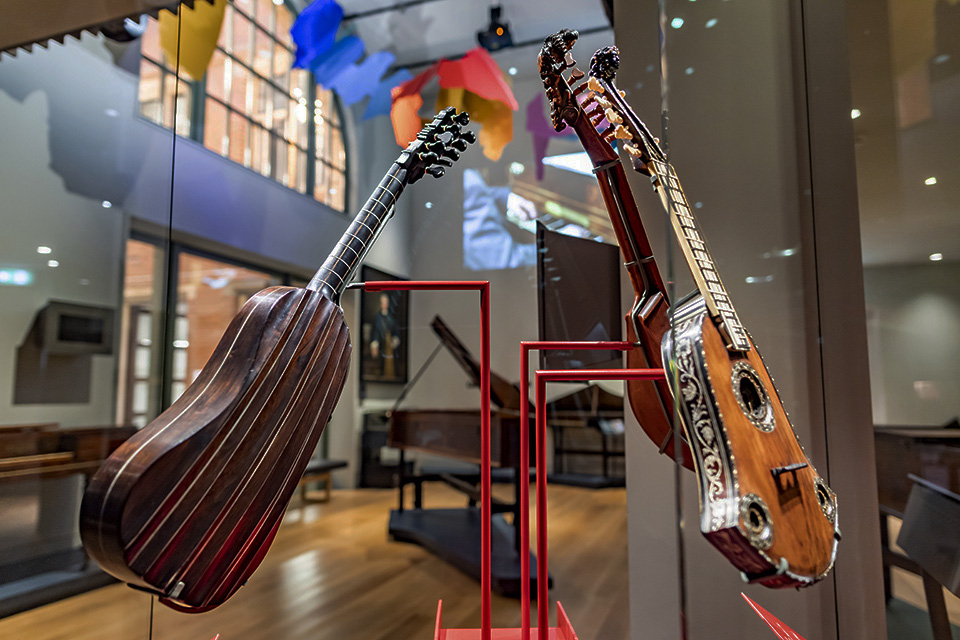


.jpg)
